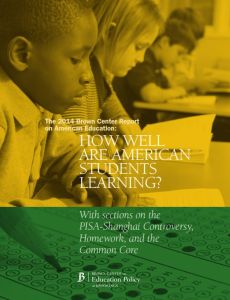Join getAbstract to access the summary!

Join getAbstract to access the summary!
Tom Loveless
How Well Are American Students Learning?
The 2014 Brown Center Report on American Education. With sections on the PISA-Shanghai Controversy, Homework, and the Common Core
Brookings Institution Press, 2014
What's inside?
Brookings takes a clear-eyed look at three education hot spots: homework, Chinese test scores and the Common Core.
Recommendation
The Brookings Institution’s 2014 Brown Center Report on American Education explores three topics: whether China’s household-registration system skews its results on an important international test; whether American students’ homework load has spun out of control and whether the Common Core State Standards (CCSS) boosted student achievement in math in the US. Tom Loveless, a Brown senior fellow, describes the way China’s hukou system culls migrant children out of Shanghai’s schools, thus clouding the validity of tests that show its students outscoring their peers around the world. As for homework, Brown’s researchers found little change in average US student workloads in the past 30 years, despite popular contentions to the contrary. Regarding Common Core, the center found that US states with a stronger implementation of these standards improved their math scores more than other states – but only slightly. Lay readers may find the Common Core methodology descriptions become a bit dense, but the Brown Center provides a service by bringing research rigor to these emotional issues in education. getAbstract recommends the report to education policy makers, administrators, teachers, parents and anyone seeking insight into these crucial educational questions.
Summary
About the Author
Tom Loveless is a senior fellow with The Brooking Center’s Brown Center on Education Policy. Mike Gallaher, Katharine Lindquist and Sarah Whitfield provided research assistance.
















Comment on this summary